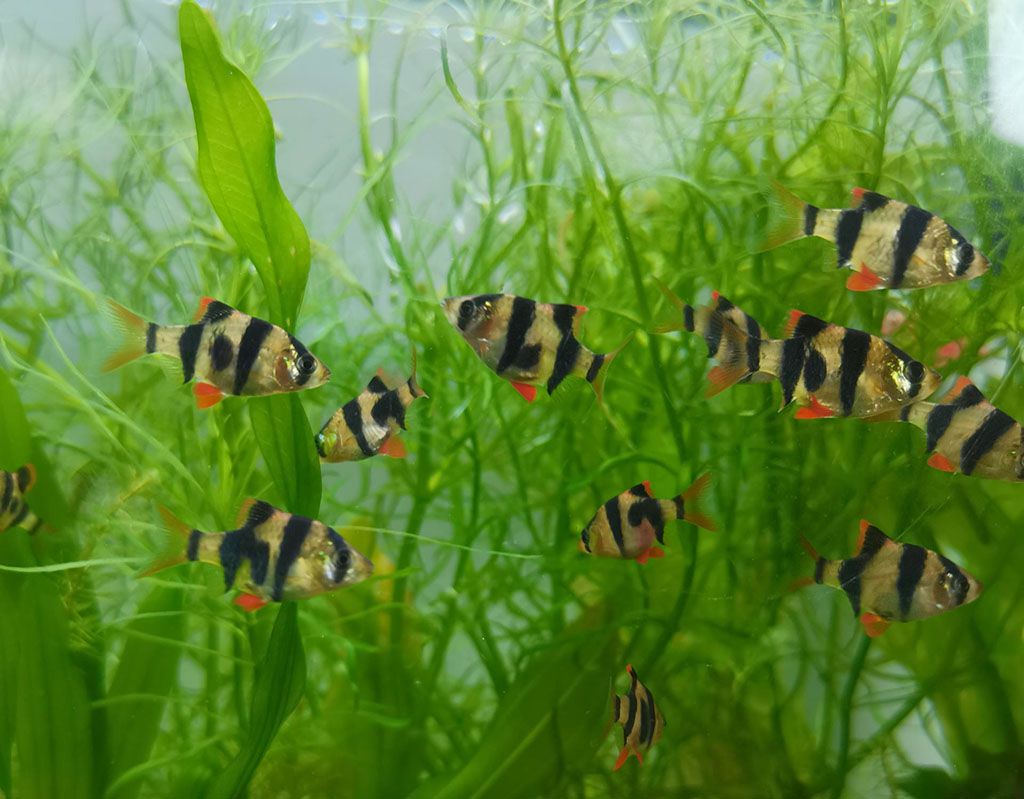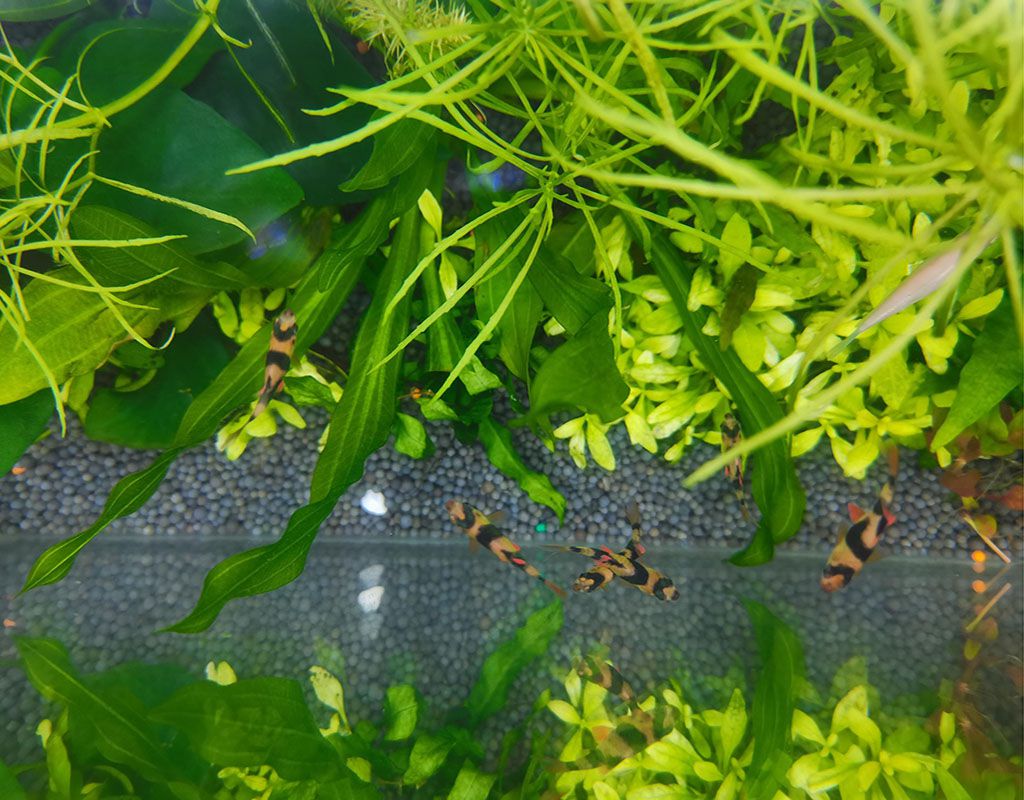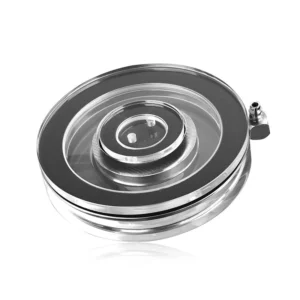Tiger barbs are one kind of popular tropical freshwater fish. They are vibrant, hardy, and easy to care for. Accordingly, tiger barbs are friendly to beginners. Sounds not bad? And want to know more about tiger barbs? Just continue reading. Today’s article will get into further learning about tiger barbs. Let’s dive in.
Content Table
Tiger Barb Group
If you know little about tiger barbs, it is recommended to learn some basic information about them.

| Scientific name | Puntigrus tetrazona |
| Common name | Sumatra barb/Partbelt Barb |
| Family | Cyprinidae |
| Origin | Asia |
| Temperament | Semi-aggressive |
| Size | 2–3 inches |
| Lifespan | 5–7 years |
| Diet | Omnivore |
| Minimum tank size | 20 gallons |
With a triangular-shaped snout, a pointed head, and a high back, tiger barbs possess a wide and round body. Female tiger barbs are larger and rounder than male ones. Generally, tiger barbs are in gold or silver colors. Also, there are four vertical black strips on their body. Besides, their fins are red or orange. Specifically, there are red edges on the dorsal, caudal, and anal fins, while the pelvic and pectoral fins are red.
On the other side, tiger barbs are omnivores. As for the diet, they are not picky. Live, frozen, freeze-dried, flake food, and other food sources are feasible, such as daphnia, brine shrimp, and blood worms. It is feasible to feed them twice a day. And you should make sure that they finish eating within 2–3 minutes.
Are Tiger Barbs Good Beginner Fish
To be honest, tiger barbs are easy to care for, so they are good beginner fish. Usually, tiger barbs are not picky about water parameters. The ideal water parameters are as follows:
- Water temperature: 75-80℉
- pH level: 6.0-8.0
- Hardness level: 10 dGH

Tiger barbs are schooling fish. Hence, it is better to keep them in groups of 6 or more. Doing so can help to reduce the stress on fish and avoid health problems. But do not overstock, which is harmful to fish in tanks. Moreover, tiger barbs are fin nippers. They would nip tank mates’ fins. Therefore, you should be cautious when introducing tank mates. In addition to this, tiger barbs are egg scatters, and they may eat their eggs. Thus, it is necessary to set up a separate breeding tank. And you should remove the tiger barbs from the breeding tank after spawning.
What Aquarium Supplies Do Tiger Barbs Need
To provide a natural and comfortable environment for tiger barbs, it is essential to add some aquarium supplies, like an aquarium lid, aquarium light, aquarium filter, aquarium heater, aquarium air pump, air stone, driftwood, small rocks, caves or others. Seeing that tiger barbs fancy water with high oxygen levels, consequently, it is vital to add an air pump to the tiger barb aquarium. It can create bubbles to aerate the fish tank and increase surface agitation, then improve the oxygen level in the water. Also, an air pump helps to expel excess carbon dioxide.
Aside from adding an aquarium air pump, there are other ways to promote the oxygen level, for example pouring water from a height, building a great aquarium filtration system, and adding a powerhead or an air stone. Specifically, the air stone is porous, which is connected to an air pump and creates bubbles in fish tanks. Bubbles can not provide oxygen to the water directly. The surface agitation by bubbles promotes water circulation, and then the oxygen concentration in tanks gets improved.
For instance, a fish tank bubbler with dense bubbles is an excellent alternative. With a high dissolving oxygen rate, it refines the air from the air pump into smaller and denser bubbles, which achieves an “atomization” effect. The bubble size can be adjusted with the control valve.

Do Tiger Barbs Eat Other Fish?
Tiger barbs may get stressed if you keep one alone. As a result, it is recommended to keep them in a school of 6 or more. On the other hand, tiger barbs are fast swimmers and semi-aggressive, and they are active in aquariums accordingly. Thus, you should be careful when choosing the tank mates for tiger barb aquariums. Otherwise, it may lead to injuries and even deaths. Usually, fish with short fins or moving fast can be great tiger barb tank mates. Also, other barbs are suitable.
On the contrary, do not keep tiger barbs with aggressive and large fish, as well as fish with long fins. Additionally, tiger barbs should be introduced last in a community tank. Or they would become aggressive to other fish. By the way, there are some recommendations about tiger barb tank mates:
- Some suitable tiger barb tank mates: Tetra, Platy, Corydoras catfish, Pictus catfish, Rosy barb, Cherry barb
- Some unsuitable tank mates for tiger barbs: Betta, Gourami, Angelfish
Reminder
After reading, have you learned more about tiger barbs? Here are also some things you should pay attention to. We would like to cover some causes of tiger barb deaths, including overcrowding, overfeeding, water parameter fluctuations, loss of beneficial bacteria, disease, and others. Overcrowding and overfeeding may cause poor water quality, which results in the loss of beneficial bacteria. To avoid this problem, you should dechlorinate the new water and keep clean water in the fish tank. Additionally, you can add beneficial bacteria to the tiger barbs aquarium.
For the frequency and methods to add beneficial bacteria to aquariums, you can go to How Often to Add Bacteria to Aquariums. That is all. Finally, thank you for reading.


Leave a comment